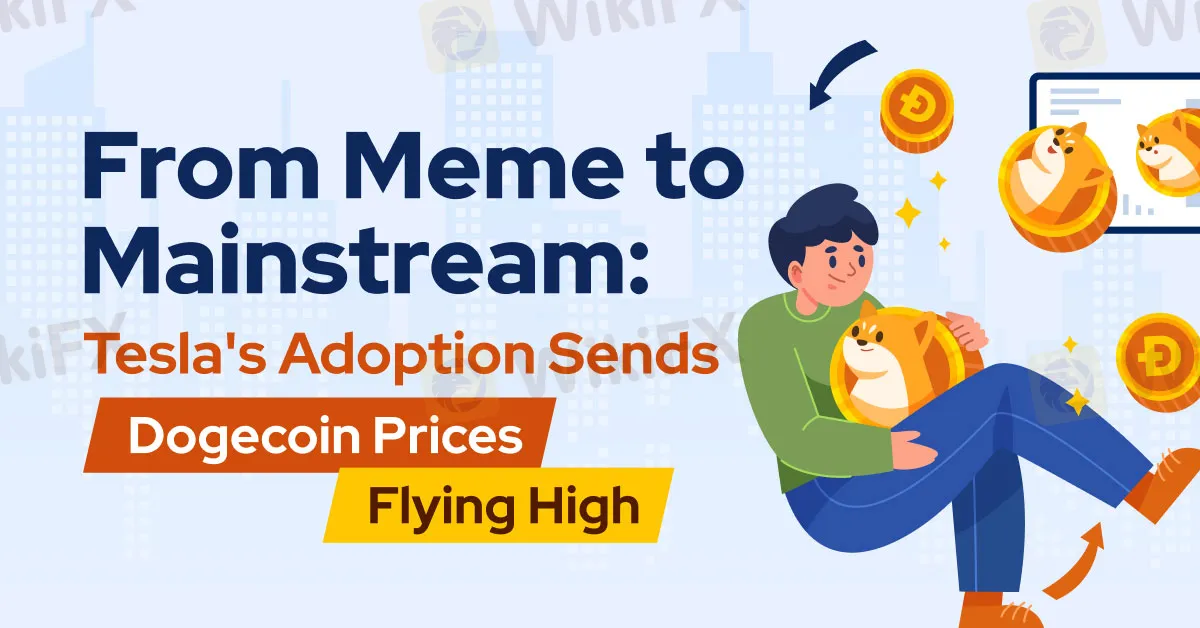简体中文
繁體中文
English
Pусский
日本語
ภาษาไทย
Tiếng Việt
Bahasa Indonesia
Español
हिन्दी
Filippiiniläinen
Français
Deutsch
Português
Türkçe
한국어
العربية
From Meme to Mainstream: Tesla's Adoption Sends Dogecoin Prices Flying High
Abstract:Recently, Tesla has quietly updated its website, unveiling its acceptance of DOGE as payment for select products. While the option to purchase a Tesla vehicle with DOGE remains unavailable, customers can utilize DOGE to acquire various merchandise items.

Elon Musk, CEO of Tesla, stirred the virtual waters on April 2, 2019, when he casually lauded Dogecoin as his “favorite cryptocurrency” via X (formerly known as “Twitter”). This seemingly innocuous endorsement set off a chain reaction, propelling Dogecoin into the limelight and ushering in a new era of memecoin mania. Fast forward five years, Musk's affection for DOGE endures, evidenced by Tesla's recent embrace of DOGE payments for its merchandise offerings.
During a visit to the Berlin gigafactory, Musk entertained inquiries regarding the possibility of enabling DOGE payments for Tesla vehicles. In response, Musk expressed receptiveness to the idea, eliciting enthusiastic cheers from the audience.
Shortly thereafter, on May 4, Tesla discreetly updated its website, unveiling its acceptance of DOGE as payment for select products. While the option to purchase a Tesla vehicle with DOGE remains elusive, customers can utilize DOGE to acquire various merchandise items.

The transaction process is straightforward: users are allotted a brief window to transfer a specified amount of DOGE to the Tesla wallet, inclusive of applicable taxes and fees. Failure to complete the transaction within the allotted timeframe prompts a reset, generating a new DOGE amount aligned with the token's updated price. Notably, all DOGE purchases are deemed final and non-refundable.
Despite Tesla's decision not to issue a formal announcement regarding this development, enthusiasts of both the company and DOGE swiftly detected the alteration. Media outlets promptly caught wind of the news, catalyzing a surge in DOGE's price. Within days, DOGE surged from under $0.13 on May 2 to nearly $0.17 by May 6, marking a remarkable price hike of over 20% and adding more than $7 billion to DOGE's market capitalization.
This initiative represents Tesla's second foray into cryptocurrency payments. In 2021, Tesla made headlines by purchasing $1.5 billion worth of Bitcoin and subsequently permitting customers to utilize Bitcoin for transactions. However, the company later reversed course, citing environmental concerns associated with Bitcoin mining and transactions.
This decision carries significant weight, considering that DOGE, a derivative of Bitcoin, employs similar mining techniques for transaction verification. While DOGE operates on a smaller scale and incurs fewer emissions compared to Bitcoin, environmental impact remains a pertinent consideration for Tesla. Nonetheless, it's reasonable to assume that Musk took such factors into account when greenlighting DOGE payments.
Tesla's integration of DOGE could signify cryptocurrency's potential as a viable medium of exchange and store of value in the future. As a perennial trailblazer in innovation, Tesla's embrace of DOGE may offer a glimpse into the evolving landscape of cryptocurrency adoption and utilization.

Disclaimer:
The views in this article only represent the author's personal views, and do not constitute investment advice on this platform. This platform does not guarantee the accuracy, completeness and timeliness of the information in the article, and will not be liable for any loss caused by the use of or reliance on the information in the article.
Read more

Bybit Shuts Down NFT Marketplace Amid Crypto Market Downturn
Bybit announces the closure of its NFT marketplace, citing efforts to streamline offerings. Discover the latest trends in the declining NFT market and its shift to utility-based growth.

Galaxy Digital Settles $200M in Luna Token Manipulation Case
Galaxy Digital pays $200M to settle Luna token manipulation probe by NY regulators, linked to TerraUSD’s 2022 crash, impacting crypto market stability.

Vanuatu Passes VASP Act to Regulate Crypto and Digital Assets
Vanuatu's new VASP Act regulates crypto businesses, enforcing strict licensing, AML/CFT compliance, and investor protections.

Blockchain Decentralization: Empowering a Trustless Future
In recent years, blockchain technology has rapidly evolved from a niche innovation behind Bitcoin into a transformative force across industries. At its core, blockchain decentralization refers to the distribution of authority and decision-making away from a central entity and into the hands of a distributed network of participants. This shift redefines how data is stored and verified and paves the way for trustless, transparent, and resilient systems that challenge traditional centralized models.
WikiFX Broker
Latest News
TradingView Brings Live Market Charts to Telegram Users with New Mini App
Trump tariffs: How will India navigate a world on the brink of a trade war?
Interactive Brokers Launches Forecast Contracts in Canada for Market Predictions
Authorities Alert: MAS Impersonation Scam Hits Singapore
Stocks fall again as Trump tariff jitters continue
INFINOX Partners with Acelerador Racing for Porsche Cup Brazil 2025
Regulatory Failures Lead to $150,000 Fine for Thurston Springer
April Forex Trends: EUR/USD, GBP/USD, USD/JPY, AUD/USD, USD/CAD Insights
March Oil Production Declines: How Is the Market Reacting?
Georgia Man Charged in Danbury Kidnapping and Crypto Extortion Plot
Currency Calculator







